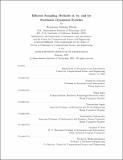Efficient Sampling Methods of, by, and for Stochastic Dynamical Systems
Author(s)
Zhang, Benjamin Jiahong
DownloadThesis PDF (23.23Mb)
Advisor
Marzouk, Youssef M.
Terms of use
Metadata
Show full item recordAbstract
This thesis presents new methodologies that lie at the intersection of computational statistics and computational dynamics. Stochastic differential equations (SDEs) are used to model a variety of physical systems, and computing expectations over marginal distributions of SDEs is important for the analysis of such systems. In particular, quantifying the probabilities of rare events in SDEs -- and elucidating the mechanisms by which these events occur -- are critical to the design and safe operation of engineered systems.
In the first part of the thesis, we use data-driven tools for dynamical systems to create methods for efficient rare event simulation in nonlinear SDEs. Our approach exploits the relationship between the stochastic Koopman operator and the Kolmogorov backward equation to derive optimal importance sampling and multilevel splitting estimators. By expressing an indicator function over a rare event in terms of the eigenfunctions of the stochastic Koopman operator, we directly approximate the associated zero-variance importance sampling estimator. We also devise efficient multi-level splitting schemes for SDEs by using the Koopman eigenfunctions to approximate the optimal importance function.
Stochastic dynamical systems can also be tools for solving problems in computational statistics. Creative uses of SDEs have been instrumental in developing efficient sampling methods for high-dimensional, non-Gaussian probability distributions. The second part of the thesis develops new sampling methods that employ judiciously constructed SDEs. We first present a framework for constructing \emph{controlled} SDEs that can sample from a large class of probability distributions with Gaussian tails, in finite time. By choosing a linear SDE to be the uncontrolled reference system, we synthesize feedback controllers that drive the sampling of such distributions. We identify and approximate these controllers by solving only a static optimization problem.
Next, we develop novel approaches for accelerating the convergence of Langevin dynamics-based samplers. Reversible and irreversible perturbations of Langevin dynamics can improve the performance of Langevin samplers. We present the geometry-informed irreversible perturbation (GiIrr) and show that it accelerates convergence of Riemannian manifold Langevin dynamics more than standard irreversible perturbations. We then propose the transport map unadjusted Langevin algorithm (TMULA), and show that the use of transport enables rapid convergence of the unadjusted Langevin algorithm for distributions that are not strongly log-concave. We also make connections between transport maps and Riemannian manifold Langevin dynamics to elucidate how transport maps accelerate convergence.
Date issued
2022-02Department
Massachusetts Institute of Technology. Department of Aeronautics and AstronauticsPublisher
Massachusetts Institute of Technology